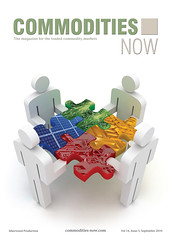How Commodity Prices Affect the Global Economy
The global economy is more closely intertwined than you may think. Understanding how the prices of common goods and commodities affects the global economy could save you a lot of money in the long term.
We live in a global economy. Famines, floods and industrial action on another continent can affect food prices, air fares and the price of luxury goods in our home town and yet all-too-often, we remain blissfully unaware of what’s happening abroad and what commodity prices mean for our wallets.
You don’t have to follow global commodity prices closely to save a lot of money, but it is a good idea to pay attention to trends. Rising fuel and oil prices will eventually be reflected in the cost of air fares and public transport and if fertilizer goes up, food will surely follow.
Preparing For The Future.
Some people use their knowledge of commodity prices to predict what will happen with common household items, allowing them to stockpile items before prices skyrocket. For example, if the price of fuel goes up, exotic foods that need to be transported from foreign countries will increase in price to cover the shipping cost – buying that food while it is cheap and freezing it, could dramatically reduce your grocery bill.
The Economy on a Larger Scale.
Understanding how the economy is affected on a larger scale is important too. Falling commodities prices can work alongside other economic factors to give banks more room to manoeuvre. The Bank of England recently resumed bond-buying in an attempt to galvanise the economy in light of slowing growth and falling economy prices. Meanwhile, the European Central Bank has also said that it would like to do more, because economists forecast inflation rates of just 1.3 percent, which is well under their targets for the next year.
Cheap food and a low consumer price index is a good thing in countries with high inflation, but falling commodity prices for other goods do not always equate to instant savings for consumers. It can take several months for falling commodities prices to get passed on to the consumer in the case of complex electronics, vehicles, or high end consumer goods and because the price of those goods is not always a reflection of the value of the materials, but rather the complexity of building the product, the savings are not always as big as the consumer may immediately expect. This means that you shouldn’t expect to see a huge drop in the prices of cars simply because metals and oil are getting cheaper.
Tracking global commodity prices could give you the early warning you need to stockpile while things are cheap, saving you a lot of money when the prices of basic household items goes up. If you decide to take a more pro-active stance and invest, commodities, especially ones such as fertilizer and metals, are always in demand and are generally a safer bet than the much more volatile currency market.
AUTHOR BIO
Martin Turner is a professional currency and commodities trader as well as a prolific finance blogger. Martin enjoys helping those at the start of their careers save money and turn small funds into useful investments. To learn more about commodities and investing, click here.

Category: Commodity Prices






